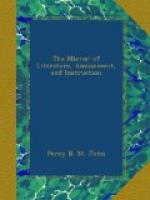TOMB OF GOWER, THE POET.
[Illustration: Tomb of Gower, the Poet.]
Dr. Johnson has dignified Gower with the character of “The father of English poetry”; so that no apology is required for the introduction of the above memorial in our pages. It stands in the north aisle of the church of St. Mary Ovrie, or St. Saviour, Southwark; and is one of the richest monuments within those hallowed walls. The tomb consists of three Gothic arches, the roof of which springs into several angles. The arches are richly ornamented with cinnquefoil tracery, roses, and carved work of exquisite character. Behind these arches are two rows of trefoil niches; and between them also rises a square column, of the Doric order, surmounted by carved pinnacles. On the extremity of the arches is placed richly carved foliage, of a similar character to that which ornaments the edges of the arches; and in the centre are circles enclosing quatrefoils. From the bases of the two middle square columns descend roses, and other foliage; and from the lower extremities of the interior arches descend cherubim. Within three painted niches, are the figures of Charity, Mercy, and Pity, round whom are entwined golden scrolls bearing the following inscriptions:
“Pour la Pitie Jesu regarde.
Et tiens cest Ami en saufve Garde.”
Jesu! for thy compassion’s sake
look down,
And guard this soul as if it were thine
own.
On the second scroll is written:
“Oh, bon Jesu! faite
Mercy,
Al’ Ame dont le Corps gist icy.”
Oh! good Jesu! Mercy
shew
To him whose body lies below.
On the third scroll is written:
“En toy qui es Fitz de Dieu le
Pere,
Saufve soit qui gist sours cest Pierre.”
May he who lies beneath this stone,
Be sav’d in thee, God’s only
son![1]
[1] These translations are somewhat freely made.
Between each of these figures are painted blank trefoil niches; and below the whole, on a plain tablet, the following inscription:
“Armiger scutum nihil
a modo fut tibi tutum,
Reddidit immolutum, morti
generali tributum,
Spiritus exutum se gaudeat
esse solutum,
Est ubi vistutum, Regnum sive
labe statutum.”
On the left side:
“Hoc viri
Inter inclytos memorandi
Monumentum sepulchrali,
Restaurari propriis impensis
Parocnia hujus meolae
Curaverunt
A.D. MDCCXCVIII.”
On the right side:
Capellaris {GULIELMO day
{
&
{GULIELMO
WINCKWORK.
Custodibus {GULIELMO Swaine
{
&
{Davide
Durie.
Aotante humiblimo Pastore Davide Gilson.




